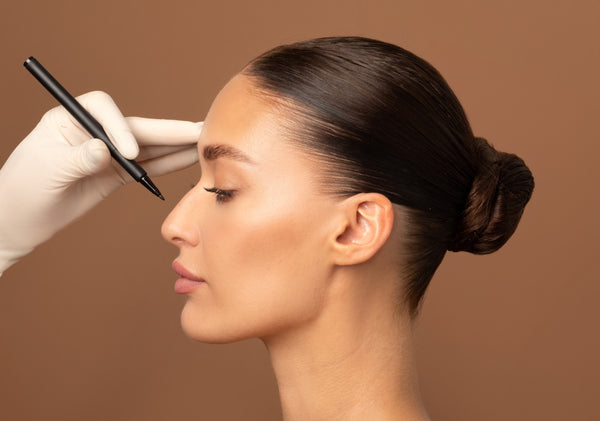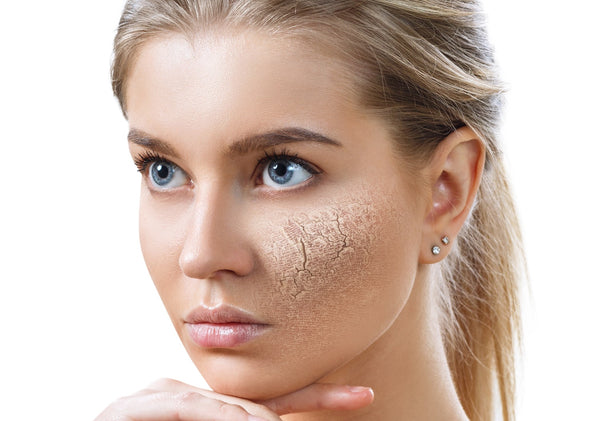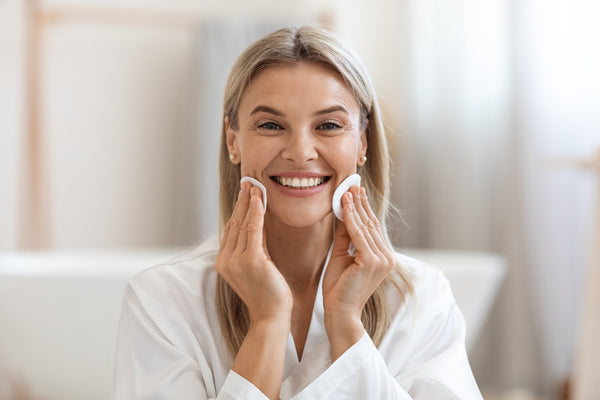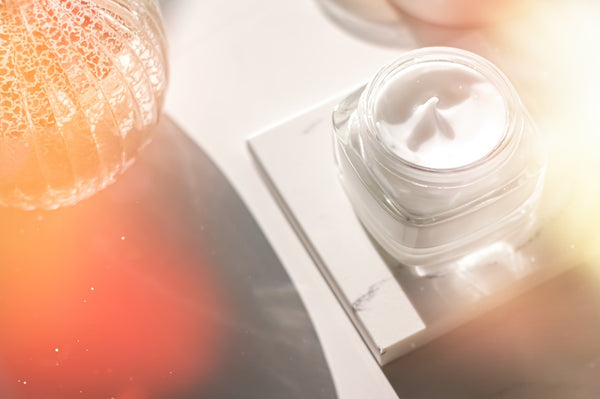Blue Light Skin Damage: Navigating Through the Debate

In today’s digital era, we’re constantly surrounded by screens—from smartphones and watches to television and computers. But as we bask in the glow of their convenience, are we overlooking a possible source of our complexion woes: blue-light skin damage?
At MD GLAM, we’re big fans of cutting-edge tech and gadgets. That said, it’s hard to ignore the potential links between screen time and skin health. It’s a topic that’s sparked much debate, but today—we’re here to uncover the facts.
Consider this article your official skin and blue light guide. Together, we’ll explore the science behind blue light, separate the facts from the myths, and offer tips on digital-age skincare.
Unveiling the Science: How Does Blue Light Interact with Skin?
Before diving into the science, you’ll want to understand what blue light actually is.
Also known as high-energy visible (HEV) light, blue light is emitted by the sun and artificial sources like digital screens and LED or fluorescent lighting. When we talk about blue light skin damage, we’re referring to the artificial blue light from our electronic devices.
Some experts have begun to shed light on the accelerated effects of artificial blue light and aging. This is because artificial blue light penetrates your skin even deeper than UV light, reaching the collagen and elastin that keep it firm and youthful.
But this prolonged exposure doesn’t just hurt your skin. It can trigger various health issues like eye strain, sleep disturbances, and more.
Now, let’s be honest—ditching the screens in today’s digital world is next to impossible. Fortunately, you have effective blue light skincare as your next line of defense—but more on that in a bit.
First, let’s talk about what happens when you forego blue light protection in your skincare.
Potential Damages: Screen Time and Skin Health
Just how crucial is it to shield our complexions from blue light? Here are some effects of extended screen time on skin health:
Premature Aging
Blue light can penetrate deep into your skin, breaking down the collagen and elastin that keep skin firm and youthful.
Hyperpigmentation
Prolonged exposure to blue light can bring about dark spots and an uneven skin tone, leaving your complexion less than vibrant.
Weakening of Skin Barrier
Think of your skin barrier as a built-in protective shield for your complexion. Too much blue light weakens your skin's natural barrier, making it more vulnerable to environmental damage.
Sleep Cycle Disruption
Did you know most sleep experts suggest avoiding screens an hour or so before bed? This is because blue light exposure before bed can disrupt your sleep cycle. And we all know how important a good night's sleep is for healthy skin.
Potential for Skin Cancer
While research is ongoing, some suggest prolonged blue light exposure could increase your risk of skin cancer.
The good news? You can harness the power of effective blue light skincare to counteract these effects and keep skin glowing amidst our tech-saturated world.
MD GLAM Blue Light Defense: Protecting Skin From Screens
Think all skincare shields skin from blue light? Think again.
At MD GLAM, we understand the importance of multifaceted skin protection. That's why we formulate our products to nourish and rejuvenate, plus fight against modern-day challenges our skin faces, like blue light damage.
Here are three stand-out products that go above and beyond to combat blue light:
Sunshout Sunscreen SPF 50
Sunscreen is a skincare staple, but when it comes to blue light? Not all SPFs are created equal.
We formulated Sunshout with ingredients that deliver comprehensive protection against UVA, UVB, and blue light. Zinc Oxide and octinoxate create a physical barrier, while antioxidants and botanicals create an internal layer of defense.
DMAE Antioxidant Day Moisturizer
Antioxidants for blue light defense? They’re game-changing.
That’s why we created DMAE Antioxidant Day Moisturizer, loading it with powerful antioxidants like Vitamin C and E, known for neutralizing free radicals and boosting skin health.
Retinol-C Intense Eye Serum
Most retinol doesn’t directly mitigate blue light but instead combats the effects of prolonged exposure.
This potent, skin-loving ingredient does wonders for balancing skin tone and reversing signs of aging—all of which can be impacted by blue light. But our Retinol-C serum goes a step further. Infused with Vitamin C, it contains ingredients that directly fend off blue light skin damage.
MD GLAM blue light defense? Check. Now for some tips and tricks.
Protecting Skin from Blue Light: Tips and Tricks
The right skincare can make all the difference in protecting your skin from blue light, but why stop there?
Here are a few lifestyle habits you can incorporate to boost your protection:
- Use blue-light-blocking screen protectors - These screen protectors can be easily applied to your devices, helping to filter out blue light.
- Wear blue-light-blocking glasses - These glasses filter out blue light to the eyes, reducing eye strain and under-eye damage.
- Take regular screen breaks - Follow the 20-20-20 rule: every 20 minutes, step 20 feet away and focus on something else for at least 20 seconds.
- Use night-mode on your devices - Most devices now have a night mode setting for reducing blue light emission.
- Maintain a healthy distance from your screens - Remain conscious of the distance from your screens to minimize exposure.
Before we wrap up, let’s take a moment to separate fact from fiction.
Blue Light Myths Debunked: Separating Reality from Rumors
Amidst this oh-so-digital age, skincare is always changing. It's easy for the facts and myths to blur together.
Eager to uncover the truth? Let’s play a game of true or false:
All blue light is harmful to the skin.
False—While prolonged exposure to artificial blue light can harm the skin, natural blue light from the sun helps regulate our sleep and wake cycles.
Blue light can cause DNA damage in skin cells.
True—Blue light exposure can trigger DNA damage in skin cells, potentially leading to premature aging and other skin issues.
Blue light can damage the skin even if you're not directly in front of a screen.
True—Blue light can reflect off other surfaces and still cause damage, even if you're not directly in front of the source.
Blue light doesn’t affect skin hydration.
False—Some experts claim that blue light exposure can affect your skin's ability to retain moisture, leading to dryness and dehydration.
Blue light can affect the skin's natural healing process.
True—Blue light may impair your skin's natural healing abilities, which means longer recovery times for wounds and other injuries.
All skincare products protect against blue-light skin damage.
False—As we‘ve learned, not all skincare products are formulated with blue light protection in mind.
Final Reflections: Glowing in the Digital Age
Today, our devices are practically an extension of ourselves. And since we’re not parting with them anytime soon, we need the right products and lifestyle to ward off blue light skin damage and keep skin glowier than ever.
At MD GLAM, we’re proud to create skincare that nourishes your skin and fortifies it from the inside out.
If you’re ready to start protecting your skin from blue light, shop our collection of powerful, medical-grade skincare today.









